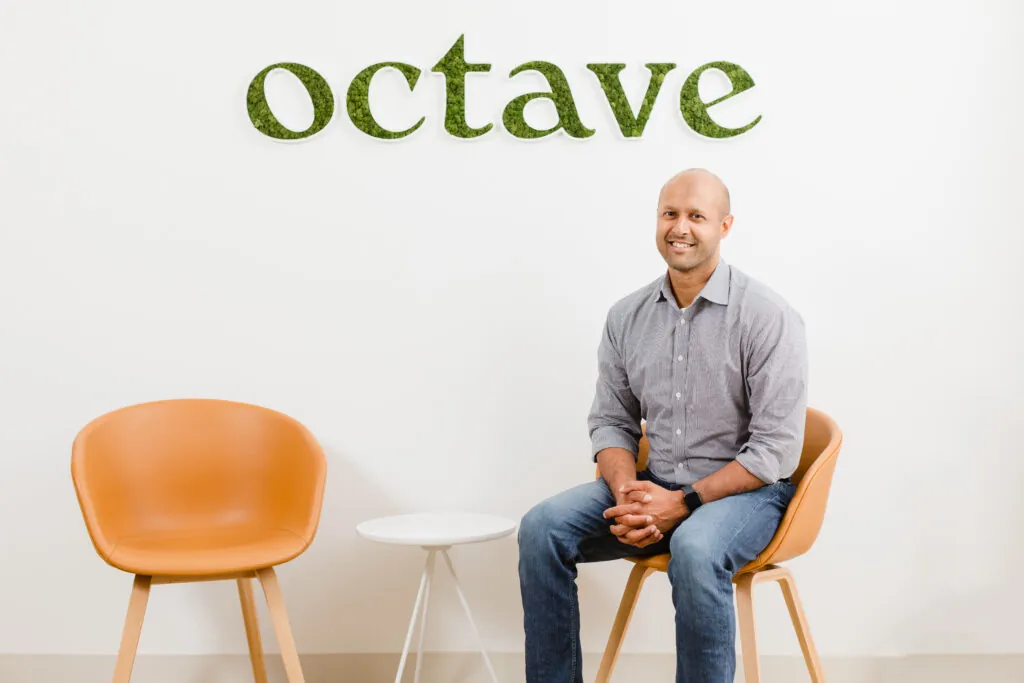Digital behavioral health startup Octave has landed $52 million in a Series C funding round led by Cigna Ventures, Novo Holdings and Avidity Partners.
This new infusion of capital will fuel the virtual care provider’s expansion into all 50 states by 2024. The latest funding round brings the company’s total raise to $86 million. Behavioral Health Business previously reported on a $22 million raise, which is part of the Series C total.
Octave was founded in 2018 by One Medical vet Sandeep Acharya after he noticed that about a third of all primary care patients were also dealing with anxiety or depression – or both.
“I was focused from the beginning on two things that I learned from being a health care operator. … How do we offer effective care for patients? And how do we do it in a manner that’s sustainable?” Acharya, co-founder and CEO of Octave, told BHB. “And there’s a tension, right? Because the mental health system today doesn’t really interface with insurance enough. And I think there’s been a lot of effort to get providers to work with insurance.”
A hybrid approach
The company launched as a clinic-based company with brick-and-mortar locations in New York and California. But its capabilities quickly evolved to include virtual care and outcome tracking. Its provider network treats several behavioral health conditions, including depression, ADHD, bipolar disorder, chronic insomnia, eating disorders and substance use disorders.
Octave uses data-driven outcome measures to help prove efficacy in its value-based care contracts with national payers. It has also expanded to work with independent therapists.
“As the pandemic hit, we evolved from just being a clinic company to operating virtually and also working with networks of independent therapists who we think meet our quality standards,” Acharya said. “We’ve expanded from just New York and California, to seven states and en route to what we believe will be sort of a national network of really high-quality providers working together and being accountable for outcomes, being accountable for delivering effective care. And in exchange, we receive more sustainable wages in the insurance system than they have in the past.”
Octave’s model could help improve access to behavioral health services while expanding the pool of in-network providers, Acharya said. Roughly 18% of patients who use a mental health provider have at least one contact with an out-of-network mental health provider, compared to 6.8% of individuals who use a general health provider, according to a Med Care study.
“When we looked at the challenges in behavioral care in this country, there are two overlapping factors. The first is the shortage of therapists. There’s just not enough therapists – and, certainly, as you get into rural areas and subspecialty care,” Eric Snyder, a partner in the venture investments group at Novo Holdings, told BHB. “And compounding the problem is that the therapy field is generally behind in access to insurance. And many therapists continue not to take insurance.”
Planning for the future
Octave is now looking to scale its model. The company, which currently operates in seven states, is looking to soon expand to 11 states in the near term, operating in all 50 states by 2024.
While expansion is on the docket, the majority of the new capital will go toward investing in technology. The company looks expand its services and partner with payers as a technology provider to help them better manage the effectiveness of the networks they have.
Cigna Ventures, which has been a strategic partner and investor with Octave since 2021, is interested in the startup because of some of the pain points that it is solving.
“Octave brings therapists who specialize in a wide range of conditions together, as part of their own organization, which makes it easier for patients to access care – especially when they may not be sure what kind of care they need,” Rachel Anderson, principal at Cigna Ventures, told BHB in an email.
Acharya noted that it’s essential for his company to focus not only on access to care but the effectiveness of care. Better data and outcome measures could prove this.
Overall, digital health funding has dipped over the last few years. Funding for digital behavioral health companies peaked in 2021, with investors pouring $4.8 billion into startups. That number fell to $2.1 billion in 2022, and it’s likely to be down again in 2023.
Acharya attributes the company’s ability to raise during an investment lull to the market need for the product and the team’s experience.
“First and foremost, we’ve been forward-thinking. We’re not just thinking about what the market needs now, but how it’s going to evolve,” Acharya said. “We’ve made efforts for the last four years to demonstrate what effective care looks like. We think that sets us up for the next chapter. [Also], I think by having a relatively experienced team that is experienced in both health care and hyper scale [is important]. I think there’s been a lot of mistakes made in the last three to five years by well-meaning teams that haven’t navigated growth and experiences.”



